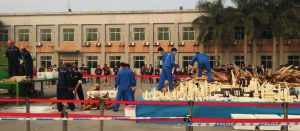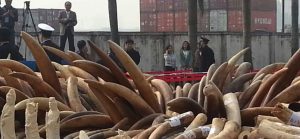China destroys ivory stockpile in ‘significant symbolic step towards saving Africa’s elephants’
At the ceremony in Guangzhou on the 6th of January, officials from the State Forestry Administration will make the strongest demonstration yet that China intends to end her role in the destruction of Africa's elephants. In December 2013 the US Government - which presides over the world's second-biggest ivory market - also destroyed its entire ivory stockpile.
At the ceremony in Guangzhou on the 6th January, officials from the State Forestry Administration will make the strongest demonstration yet that China intends to end her role in the destruction of Africa’s elephants. In December 2013 the US Government – which presides over the world’s second biggest ivory market – also destroyed its entire ivory stockpile.

When Kenya burned the first ivory stockpile in 1989 it proved to be a crucial tipping point that helped shut off demand in America, Europe and Japan and so end the killing. Two decades on, elephants are now in the grip of a new crisis that is in many ways more serious, thanks to their shrunken numbers and a demand swollen by China’s demographic and economic expansion.

Key elephant populations are plummeting across Africa. Last month a census of Tanzania’s Selous National Park, until recently the second-largest elephant population in Africa, revealed that numbers there have fallen by an estimated 67 per cent in four years to little over 13,000 elephants. This week Tanzania’s President Kikwete reminded his nation that in 1976 this population was estimated at 109,000 elephants, a figure that followed a census by Tanzanian and international scientists led by Iain Douglas-Hamilton, founder of Save the Elephants.

China observed the ivory ban for twenty years and has strong penalties for people caught trafficking, but a one-off sale of a legal stockpile in 2008 appears to have roused a dormant demand and ivory poaching in Africa began to surge.
By burning her ivory China joins the body of nations that are taking firm measures to stem the haemorrhage of elephants out of Africa,” says Dr Douglas-Hamilton. “With measures like this we can still save elephants from being driven towards extinction.

For further information or to speak with Dr. Douglas-Hamilton please contact:
Frank Pope
+254 725 777 552
[email protected]
Photos courtesy of WildAid

